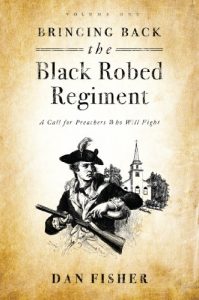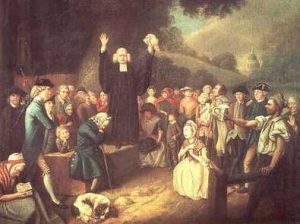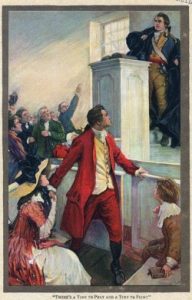Unlike today, the church in colonial and Revolutionary America served as the hub for political debate, as well as for disseminating and discussing current events. And when it came to British oppression, they didn’t hesitate to call for independence. These fiery orators were dubbed by the British as The Black Robed Regiment in reference to their black clerical robes.
Defenders of the British crown found preachers’ support of the Patriot cause particularly detrimental to their efforts to maintain loyalty among the colonists. In the 1770s, most colonists still considered themselves aligned with England. Many parishioners questioned the legitimacy of revolution. From their pulpits, members of The Black Robed Regiment reassured their congregations that their revolution was justified in the eyes of God.
In fact, the British believed so strongly that it was the preaching from colonial pulpits that pushed its citizens into rebellion that many ministers had bounties put on their heads. Loyalists burned the homes and churches of the pastors who preached against British rule. Hatred by the British for the clergy ran so deep that on the battlefield wounded ministers were frequently executed rather than taken prisoner.
One such member of The Black Robed Regiment was the Reverend Samuel West, pastor of the Congregationalist Church of Dartmouth, Massachusetts. West was invited to give the prestigious Election Day sermon in Boston in 1776. In his message he proclaimed that the colonies were already independent and constituted a new nation. “Any people, when cruelly oppressed has the right to throw the yoke, and be free.” Reverend West further declared, “To save our country from the hands of our oppressors ought to be dearer to us even than our own lives, and, next the eternal salvation of our own souls, is the thing of greatest importance–a duty so sacred that it cannot justly be dispensed with for the sake of our secular concerns.”
But the Patriot Pastors of the Revolutionary era didn’t just preach about liberty while encouraging their congregations to fight against tyranny, they led the way!
Pastor Peter Muhlenberg, A Lutheran minister, ascended the pulpit on a cold Sunday morning in 1776 and preached from Ecclesiastes 3, “To every thing there is a season, and a time to every purpose under the heaven: A time to be born, and a time to die; a time to plant, and a time to pluck up that which is planted…” Muhlenberg continued, laying the foundation for the point of his sermon. “In the language of the holy writ, there was a time for all things, a time preach and a time pray, but those times have passed away.” Imagine him standing before his congregation, his voice gaining intensity as he continued. “There is a time to fight, and that time has now come!”
Then, in dramatic fashion, Pastor Muhlenberg removed his clerical robe revealing his military uniform. He challenged his parishioners asking, “Who is with me?” Over 300 men from his church alone joined him in the fight for liberty, volunteering for what eventually became the 8th Virginia Brigade. Pastor Muhlenberg and his men fought in every major engagement of the Revolutionary War and wintered with George Washington at Valley Forge. A native Pennsylvanian, his statue, stands in the U.S. Capitol Building’s Statuary Hall–clerical robes draped over his right arm, sword firmly in his left hand.
The Reverend James Caldwell, minister of First Presbyterian Church of Elizabethtown, New Jersey, instructed his congregation that “there are times when it is as righteous to fight as it is to pray.” After the British put a bounty on his head, Caldwell went to the pulpit with two loaded flintlock pistols.
 Like Muhlenberg, Caldwell also fought alongside his congregants. When the British captured Elizabethtown, Caldwell’s men were short wadding necessary to pack ammunition in their weapons. Without it they would surely be overrun. Caldwell rode to a nearby church and gathered as many hymnals as he could carry. Returning to his men, he instructed them to rip out the pages and use them as wadding in their muskets. Having stuffed the hymns of such classic writers as Isaac Watts down the barrels of their guns, he yelled “Give ’em Watts boys, put Watts into them!” The British referred to Caldwell as the “Fighting Chaplain” and his brave leadership was immortalized in verse.
Like Muhlenberg, Caldwell also fought alongside his congregants. When the British captured Elizabethtown, Caldwell’s men were short wadding necessary to pack ammunition in their weapons. Without it they would surely be overrun. Caldwell rode to a nearby church and gathered as many hymnals as he could carry. Returning to his men, he instructed them to rip out the pages and use them as wadding in their muskets. Having stuffed the hymns of such classic writers as Isaac Watts down the barrels of their guns, he yelled “Give ’em Watts boys, put Watts into them!” The British referred to Caldwell as the “Fighting Chaplain” and his brave leadership was immortalized in verse.
“Who’s that riding in on horse-back?
Parson Caldwell, boys; Hooray!
Red-coats call him “Fighting Chaplain,”
How they hate him! Well they may!”
According to David Barton of Wall Builders, “modern historians have noted that not one single right asserted in the Declaration of Independence hadn’t been preached from colonial pulpits prior to 1763.” It wasn’t only the British who gave great attribution to the clergy but Founders like John Adams exalted the clergy’s role in stirring the hearts of the people to fight when he said, “the pulpits have thundered.”
The call to educate the church on political and social issues didn’t end with American victory at Yorktown. The Black Robed Regiment of the Revolutionary era set a precedence that inspired pastors throughout American history to instruct their parishioners on what the Bible said about issues ranging from slavery to civil rights. Patriotic pastors have led troops into battle, ministered to the wounded, written laws and public policy, lobbied our government, founded universities and have been elected to local, state and federal government offices across the nation.
 Sadly, today many pulpits are quiet when it comes to instructing the church on what the Bible has to say about the social and political issues of our day. According to Pastor Dan Fisher, author of Bringing Back the Black Robed Regiment,”Today the church has become marginalized almost to the point of cultural impotency and spiritual irrelevance.”
Sadly, today many pulpits are quiet when it comes to instructing the church on what the Bible has to say about the social and political issues of our day. According to Pastor Dan Fisher, author of Bringing Back the Black Robed Regiment,”Today the church has become marginalized almost to the point of cultural impotency and spiritual irrelevance.”
Pastor Gary Hamrick, of Cornerstone Chapel in Leesburg, Virginia, said in a recent Election Day sermon, “The church of Jesus Christ is God’s restraining force in the world today against evil. If we abdicate our responsibility as ambassadors for Christ and as agents of truth, then evil will prevail.”
If you’re interested in learning more about the movement underway challenging America’s pastors to speak up in this ever-increasing politically correct, cancel culture we live in or to obtain a Christian voter’s guide for your state, please visit the National Black Robed Regiment and view the short video.
If you’d like to learn more about how you can pray for America, our political leaders, and important social issues facing our nation, visit Intercessors for America and click on their resource tab.
Join the Conversation: Do you think the church has abdicated its role in teaching and encouraging their congregations about the important social issues of our day?






